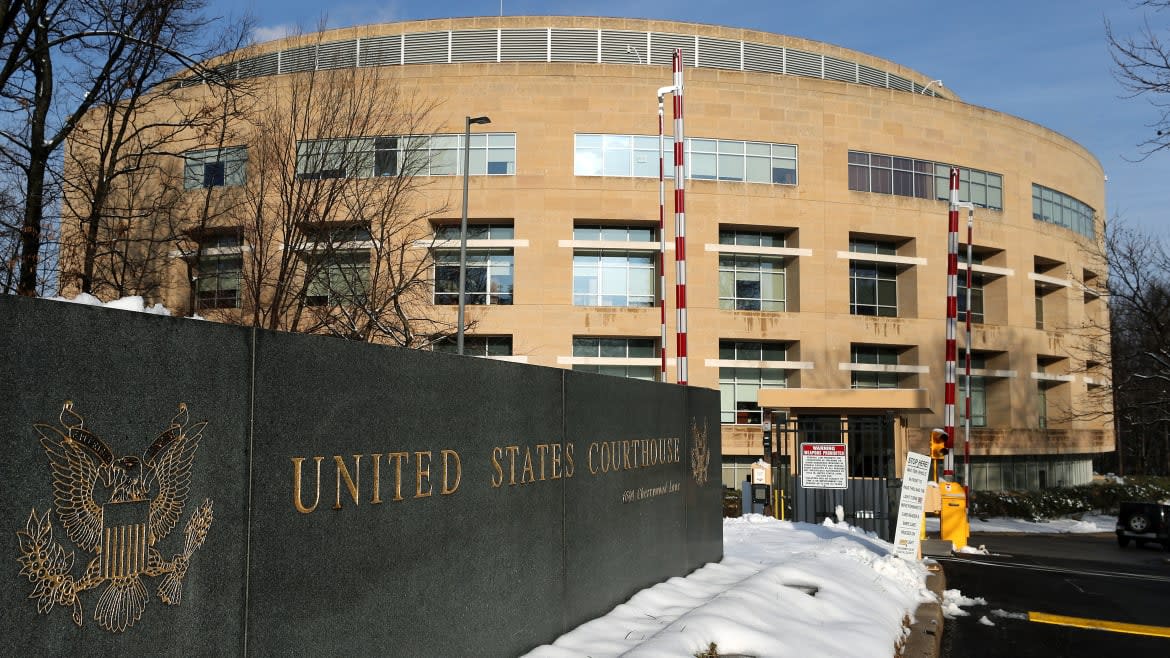Feds Say Auditor Bilked Millions of Dollars in Romance Scam

A District of Columbia financial adviser is facing charges after allegedly working with a Special Deputy U.S. Marshal in his international romance scheme to defraud over a dozen victims.
Charles K. Egunjobi, 48, was charged Friday with operating an unlicensed money service business relating to numerous online romance scams, mostly involving senior citizen victims in West Africa and the United States. Prosecutors allege that Egunjobi was instrumental in laundering money to aid in the years-long scheme spearheaded by Isidore Iwuagwu—a 35-year-old Special Deputy U.S. Marshal and Department of Justice contractor who provided security for critical federal facilities.
“If you find yourself in an online relationship and you’re asked for a bunch of money, it’s probably fraud not love,” U.S. Attorney for the District of Maryland, Erek L. Barron said in a press release after Iwuagwu’s Aug. 10 arrest. “We’re prosecuting elder fraud, including romance scams, to the fullest extent of the law.”
The scheme allegedly focused on finding victims on dating apps and posing as deployed members of the military who needed money for various personal hardships. Prosecutors allege that through the scheme that Iwuagwu conducted between October 2015 and July 2021, he allegedly bilked more than 20 victims out of almost $2 million dollars.
On Friday, Egunjobi was released under the supervision of a pretrial services officer after his initial appearance in the U.S. District Court. He did not immediately respond to a request for comment and it is not clear if he has retained an attorney.
A LinkedIn profile that appears to belong to Egunjobi shows that the D.C. resident has been an auditor for the government for almost 14 years. Prior to that, the profile says that he was an internal auditor for the Maryland Department of Health and Mental Hygiene and was a compliance officer for the Bureau of Labor Statistics. Egunjobi also received a master of professional accounting at Strayer University.
Prosecutors, however, allege that the auditor “facilitated the money laundering operations” of the scheme between September 2019 and April 2020, according to a press release announcing his arrest. A criminal complaint against Egunjobi details some of the victims of the scheme, including one who thought she was communicating with an Army soldier, deployed to Iraq named “Jose Velazquez” online in January 2020.
“During initial conversations, Velazquez told Victim A he needed money for routine expenses in Iraq,” the complaint states. “Velazquez reported he could not access his bank accounts due to insurgent activity. Velazquez subsequently requested Victim A purchase money orders on his behalf and send them to intermediaries who were ‘agents’ of the U.S. Army.”
Eventually, the victim told law enforcement that “she sent thousands of dollars to various individuals around the U.S. based on instructions provided to her,” and that she never met Velazquez. Prosecutors allege that the victim was instructed to send money to a Citibank account that belonged to Egunjobi.
The complaint states that in February 2020, the victim purchased four postal money orders—totaling $4,000—that was also made out to Egunjobi. Days later, the victim bought four more money orders for another $4,000 which were once again made out to Egunjobi.
After Iwuagwu’s arrest, authorities searched Egunjobi’s apartment and found a ledger that detailed some of the deposits he received during the scheme. Prosecutors also stated that Egunjobi bought four cars in February 2020—which he admitted he sent to “West Africa to sell for profit.”
“Purchasing used vehicles is a common form of trade-based money laundering used to conceal the nature of criminal proceeds,” the complaint states.
Prosecutors also allege the WhatsApp messages found on Egunjobi’s phone show that individuals were asking him to transfer money or cars from America to Nigeria. Messages also showed Egunjobi assisting Iwuagwu to obtain Nigerian currency.
“Between September 26, 2019, and April 23, 2020, Egunjobi made at least 21 transfers from his account at Guaranty Trust Bank, a financial institution based in Ghana, to Iwuagwu’s Access bank account in Nigeria,” the complaint states. “The transactions totaled $43,827.42 in U.S. currency.
The complaint also notes that the auditor admitted to police during an Aug. 10 interview that he “receives U.S. currency from Iwuagwu and in exchange provides Iwuagwu with Nigerian Naira.”
“While Egunjobi told law enforcement he assists Iwuagwu with converting U.S. dollars into Nigerian currency, Egunjobi also admitted he has never registered as a money service business,” the complaint states.
Get the Daily Beast's biggest scoops and scandals delivered right to your inbox. Sign up now.
Stay informed and gain unlimited access to the Daily Beast's unmatched reporting. Subscribe now.

